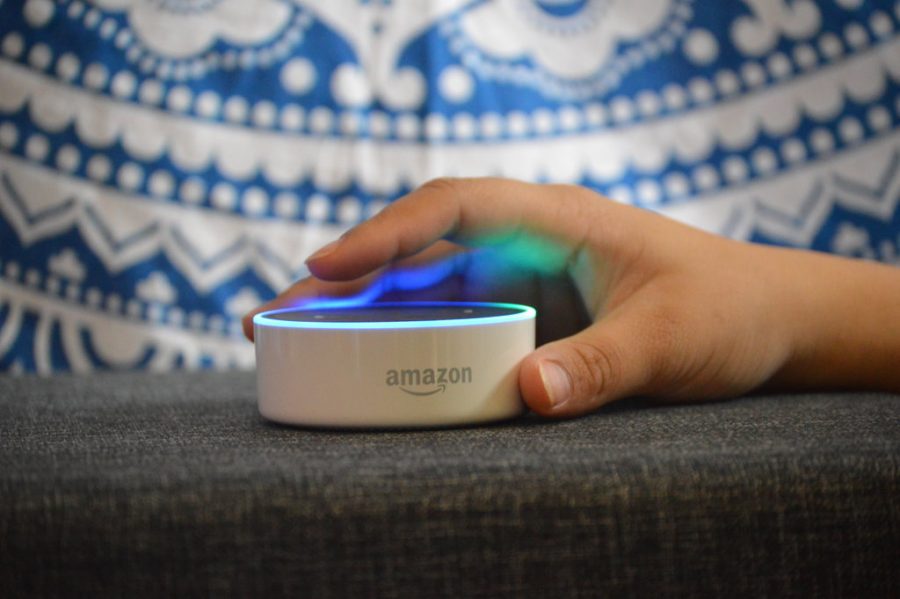Blue light flickering and synthetic voice swelling, Amazon’s Alexa starts to sing. “Technology, technology, where would I be without technology,” she croons, her melody accompanied by an equally jaunty instrumental.
“Thanks, Alexa, you can stop now,” James Brust, director of the Wakerly Media Lab for Creativity and Innovation, says. “I’ve never heard her sing that song.”
Above him, perched politely on a shelf, Alexa goes quiet again. With an undergraduate degree in journalism and media studies, Brust’s interest in high-tech preludes his time at Wakerly.
“There was a lot of emerging technology helping at that time that was impacting the world pretty significantly,” Brust says. One of those emerging technologies was Bluetooth, which wirelessly allowed an easy way to send sound to a better speaker.
Cordless speakers and headphones quickly became popular products for listening to music.
In addition to being used recreationally, Bluetooth has practical applications in the workplace. Mobility and portability are two appealing aspects of the products.
Although junior engineering student Sean Roberts’ job at an engineering firm still uses cords, he says he can imagine a future where that is no longer the case. “It would be cool to see … the foreman of the factory pull up everything on his phone,” Roberts says.
Bluetooth has become so popular that technology companies are starting to phase out ports entirely, releasing more and more phones without headphone jacks.
“What (manufacturers) are going for is a purely wireless future,” Brust says. With more and more consumers noting the impracticality of wires, companies are trying to find ways to focus on Bluetooth.
Recently, however, Amazon threw something new into the mix: artificial intelligence.
“Amazon started doing AI with Bluetooth, and it got really interesting really quickly,” Brust says.
Amazon released smart speaker Alexa in late 2014, and as of 2017 more than 20 million Alexas have been sold. Alexandra Rivera Grant, a freshman in the College of Communication, is one such owner.
“I love a good Bluetooth speaker, but being able to talk to Alexa and not have to go on your phone to find the exact song … it’s super convenient,” Grant says.
What helps Alexa stand apart, however, remains her ability to offer more utilities than a standard Bluetooth speaker. “She does it all. It’s not just for music. It’s for weather, time and events, too,” Grant says.
Although Alexa can complete many requests, she still struggles with some orders. With new AI there is a gradual learning curve. Alexa’s inability to perform perfectly is a beneficial trait, Brust says.
“Alexa is designed to respond. Normally, if I’m trying to say something, it’ll just say…” Brust trails off, pondering an example. “Hey, Alexa, drive off a cliff,” he commands. Alexa hemmed and hawed, thoroughly stumped. “Hmm, I’m not sure,” she returns.
“When Alexa came out, consumers were like, ‘what do we do with this?’” Brust says. Although Alexa brands itself as a user-friendly digital assistant, Brust suggests many consumers view the product as a way to sell other Amazon wares.
Some customers experienced the hassle of accidentally buying from Amazon, as inquiries about products may cause Alexa to order them.
“I was looking up honey butter chips from Korea and my mom wanted to ask Alexa about them, but Alexa ordered them instead,” Grant says. “My mom was really annoyed.”
Artificial intelligence remains a relatively vague product sector, with many unwilling or unsure to publicize information that otherwise could remained private. Transcripts of recorded conversations can be found on the Alexa app for iOS and Android. In addition to conversation data, Alexa knows how many times radio stations or songs are requested, the “stop” command is used, and how often the volume is asked to turn up.
Brust says addressing these anxieties remains a challenge as consumers are unclear about behind-the-scenes information processing. “Most AI is not happening on Alexa. When you interact with AI … that’s all a tiny set of triggers that go on Amazon’s servers,” Brust says.
These computations help Alexa operate more intelligently. “Alexa gets better by having lots of people use it,” Brust says.
Although a completely wireless future remains a distant, idealistic goal, artificially intelligent devices represent the next wave of accessible tech, Brust says. Where phones present a challenge for the physically impaired and the elderly, voice controlled, wireless devices resolve complications.
The goal is that I can talk to the device like a person,” Brust says. “We’re just not there yet.”





